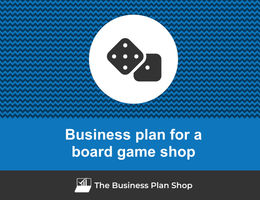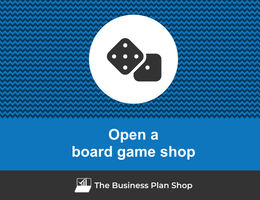How to create a financial forecast for a board game shop?
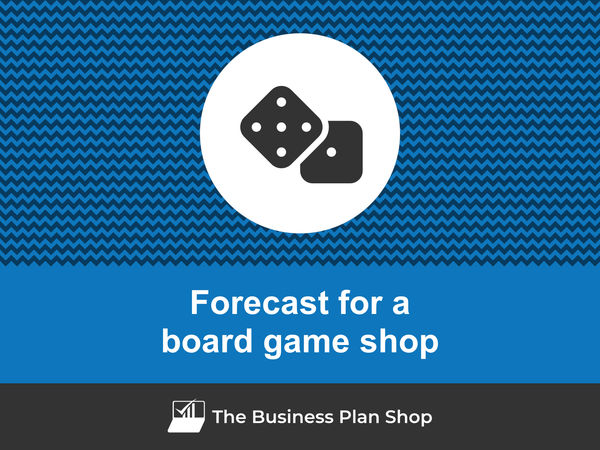
Developing and maintaining an up-to-date financial forecast for your board game shop is key in order to maintain visibility on your business’s future cash flows.
If you feel overwhelmed at the thought of putting together a board game shop financial forecast then don’t worry as this guide is here to help you.
We'll cover everything from: the main objectives of a financial forecast, the data you need to gather before starting, to the tables that compose it, and the tools that will help you create and maintain your forecast efficiently.
Let's get started!
Why create and maintain a financial forecast for a board game shop?
The financial projections for your board game shop act as a financial blueprint to guide its growth with confidence and ensure its long-term financial viability.
To create them, you will need to look at your business in detail - from sales to operating costs and investments - to assess how much profit it can generate in the years to come and what will be the associated cash flows.
During challenging market conditions, maintaining an up-to-date financial forecast enables early detection of potential financial shortfalls, allowing for timely adjustments or securing financing before facing a cash crisis.
Your board game shop's financial forecast will also prove invaluable when seeking financing. Banks and investors will undoubtedly request a thorough examination of your financial figures, making precision and presentation essential.
Need a convincing business plan?
The Business Plan Shop makes it easy to create a financial forecast to assess the potential profitability of your projects, and write a business plan that’ll wow investors.

What information is used as input to build a board game shop financial forecast?
A board game shop's financial forecast is only as good as the inputs used to build it.
If you are creating (or updating) the forecast of an existing board game shop, then you mostly need your accounting information, key historical operating non-financial data, and your team’s input on what to expect for the coming years.
If you are building financial projections for a board game shop startup, you will need to have done your research and have a clear picture of your competitive environment and go-to-market strategy so that you can forecast sales accurately.
For a new venture, you will also need a precise list of the resources needed to keep the board game shop running on a day-to-day basis and a list of the equipment and expenditures required to start the business (more on that later).
Let's now take a closer look at the elements that make up your board game shop's financial forecast.
The sales forecast for a board game shop
The sales forecast, also called topline projection, is normally where you will start when building your board game shop financial forecast.
Creating a coherent sales projection boils down to estimating two key drivers:
- The average price
- The number of monthly transactions
To do this, you will need to rely on historical data (for an existing business), market research data (for both new and existing board game shops), and consider the elements below:
- New Board Game Releases: As the owner of a board game shop, you should keep track of new board game releases in order to predict the demand for these games. Popular and highly-anticipated games will likely sell at a higher average price and increase the number of monthly transactions.
- Trends and Popularity: Certain board games may gain popularity due to social media trends, TV shows, or movies. These trends can significantly impact the average price and number of monthly transactions of related board games.
- Holidays and Special Events: Holidays and special events, such as Christmas and International Tabletop Day, can lead to an increase in demand for board games and higher sales. You should consider these events while creating your sales forecast.
- Local Gaming Community: Your business may be influenced by the size and engagement of your local gaming community. A larger gaming community can lead to more customers and potentially higher average prices and monthly transactions.
- Economic Climate: The state of the economy can affect the spending power and buying behavior of your customers. During times of economic downturn, customers may be more hesitant to spend on board games, resulting in lower average prices and monthly transactions.
After the sales forecast comes the operating expenses budget, which we will now look into in more detail.
Need a convincing business plan?
The Business Plan Shop makes it easy to create a financial forecast to assess the potential profitability of your projects, and write a business plan that’ll wow investors.

The operating expenses for a board game shop
Once you know what level of sales you can expect, you can start budgeting the expenses required to operate your board game shop on a daily basis.
Expenses normally vary based on how much revenue you anticipate (which is why, from experience, it is always better to start your forecast with the topline projection), and where your business is based.
Operating expenses for a board game shop will include some of the following items:
- Rent: This includes the cost of renting your retail space to operate your board game shop.
- Utilities: This expense covers the cost of electricity, water, and other necessary utilities for running your shop.
- Inventory: You will need to purchase new board games and other products to keep your shop stocked and attract customers.
- Marketing and Advertising: This expense includes the cost of promoting your board game shop through various channels such as social media, flyers, and local events.
- Staff Costs: You will need to pay your employees' wages or salaries, as well as any benefits or bonuses.
- Accountancy Fees: It is important to keep track of your finances, so you may need to hire an accountant to help you with taxes, bookkeeping, and other financial tasks.
- Insurance Costs: Protect your business and assets by paying for insurance coverage, such as liability insurance and property insurance.
- Software Licenses: You may need to purchase licenses for various software programs to help you manage your inventory, sales, and other aspects of your business.
- Banking Fees: This includes the cost of maintaining a business bank account, transaction fees, and any other banking fees.
- Maintenance and Repairs: Keep your shop in good condition by budgeting for maintenance and repairs, such as fixing equipment or repairing any damages to your store.
- Professional Fees: You may need to consult with lawyers, designers, or other professionals for various aspects of your business, such as legal advice or store design.
- Office Supplies: This expense includes the cost of purchasing necessary office supplies, such as paper, pens, and printer ink.
- Credit Card Processing Fees: If you accept credit card payments, you will need to pay processing fees for each transaction.
- Rent for Gaming Space: If you offer a space for customers to play board games, you may need to pay rent for that area.
- Shipping and Delivery Costs: If you offer online sales, you will need to budget for shipping and delivery costs for your products.
This list will need to be tailored to the specificities of your board game shop, but should offer a good starting point for your budget.
What investments are needed to start or grow a board game shop?
Your board game shop financial forecast will also need to include the capital expenditures (aka investments in plain English) and initial working capital items required for the creation or development of your business.
For a board game shop, these could include:
- Inventory: This includes purchasing board games, card games, and other gaming products to stock your store. You will need to consider the initial cost of purchasing these items as well as ongoing restocking costs.
- Furniture and Fixtures: These are necessary items for your board game shop such as display shelves, tables, and chairs. You may also need to purchase cash registers, computers, and other equipment for your store.
- Decor and Signage: Creating an inviting and visually appealing atmosphere is important for a board game shop. This may include purchasing decorations, signage, and other items to make your store stand out.
- Security and Surveillance: Protecting your inventory and store is crucial for any business. This may include purchasing security cameras, alarms, and other security equipment.
- Store Renovations: Depending on the location and condition of your store, you may need to make renovations to create a suitable space for your board game shop. This could include painting, flooring, and other improvements.
Again, this list will need to be adjusted according to the size and ambitions of your board game shop.
Need a convincing business plan?
The Business Plan Shop makes it easy to create a financial forecast to assess the potential profitability of your projects, and write a business plan that’ll wow investors.

The financing plan of your board game shop
The next step in the creation of your financial forecast for your board game shop is to think about how you might finance your business.
You will have to assess how much capital will come from shareholders (equity) and how much can be secured through banks.
Bank loans will have to be modelled so that you can separate the interest expenses from the repayments of principal, and include all this data in your forecast.
Issuing share capital and obtaining a bank loan are two of the most common ways that entrepreneurs finance their businesses.
What tables compose the financial plan for a board game shop?
Now let's have a look at the main output tables of your board game shop's financial forecast.
The projected profit & loss statement
The projected profit & loss shows how profitable your board game shop is likely to be in the years to come.
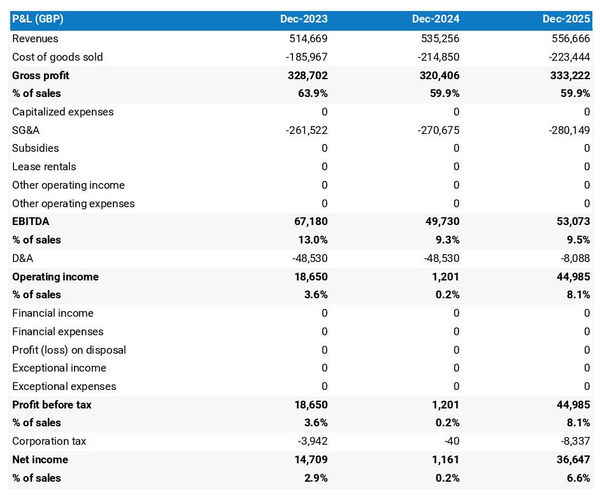
For your board game shop to be financially viable, your projected P&L should ideally show:
- Sales growing above inflation (the higher the better)
- Profit margins which are stable or expanding (the higher the better)
- A net profit at the end of each financial year (the higher the better)
This is for established board game shops, there is some leniency for startups which will have numbers that will look a bit different than existing businesses.
The projected balance sheet
Your board game shop's projected balance sheet provides a snapshot of your business’s financial position at year-end.
It is composed of three types of elements: assets, liabilities and equity:
- Assets: represent what the business possesses including cash, equipment, and accounts receivable (money owed by clients).
- Liabilities: represent funds advanced to the business by lenders and other creditors. They include accounts payable (money owed to suppliers), taxes payable and loans from banks and financial institutions.
- Equity: is the combination of what has been invested by the business owners and the cumulative profits and losses generated by the business to date (which are called retained earnings). Equity is a proxy for the value of the owner's stake in the business.
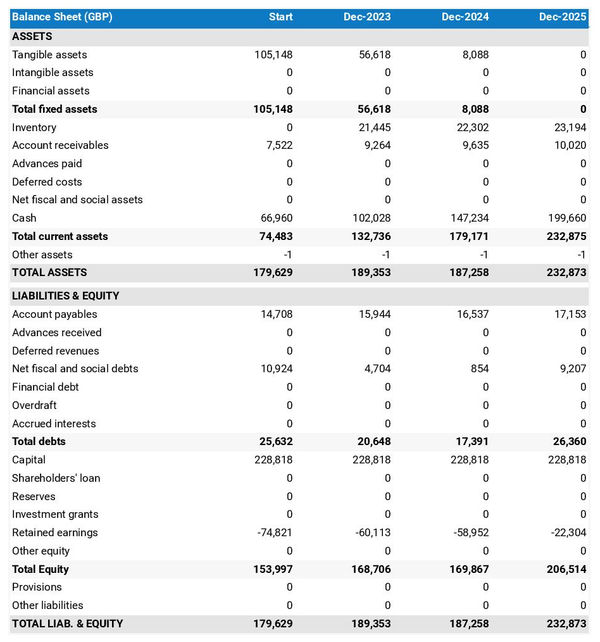
The projected cash flow statement
A projected cash flow statement for a board game shop is used to show how much cash the business is generating or consuming.
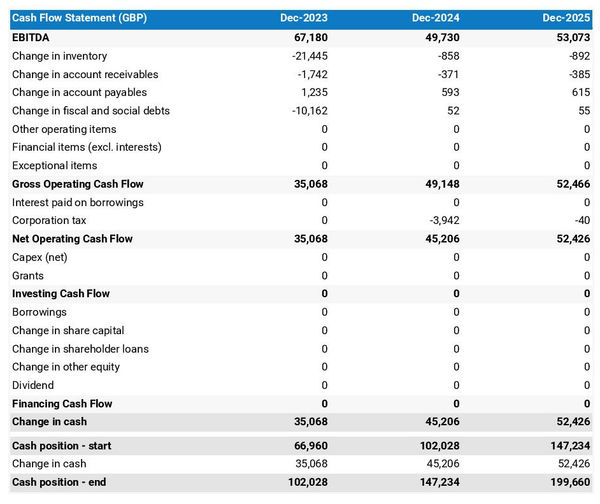
The cash flow forecast is usually organised by nature to show three key metrics:
- The operating cash flow: do the core business activities generate or consume cash?
- The investing cash flow: how much is the business investing in long-term assets (this is usually compared to the level of fixed assets on the balance sheet to assess whether the business is regularly maintaining and renewing its equipment)?
- The financing cash flow: is the business raising new financing or repaying financiers (debt repayment, dividends)?
Cash is king and keeping an eye on future cash flows is imperative for running a successful business. Therefore, you should pay close attention to your board game shop's cash flow forecast.
If you are trying to secure financing, note that it is customary to provide both yearly and monthly cash flow forecasts in a financial plan - so that the reader can analyze seasonal variation and ensure the board game shop is appropriately capitalised.
Need a convincing business plan?
The Business Plan Shop makes it easy to create a financial forecast to assess the potential profitability of your projects, and write a business plan that’ll wow investors.

Which tool should you use to create your board game shop's financial projections?
Building a board game shop financial forecast is not difficult provided that you use the right tool for the job. Let’s see what options are available below.
Using online financial forecasting software to build your board game shop's projections
The modern and easiest way is to use an online financial forecasting tool such as the one we offer at The Business Plan Shop.
There are several advantages to using specialised software:
- You can easily create your financial forecast by letting the software take care of the financial calculations for you without errors
- You have access to complete financial forecast templates
- You get a complete financial forecast ready to be sent to your bank or investors
- You can easily track your actual financial performance against your financial forecast, and recalibrate your forecast as the year goes by
- You can create scenarios to stress test your forecast's main assumptions
- You can easily update your forecast as time goes by to maintain visibility on future cash flows
- You have a friendly support team on standby to assist you when you are stuck
- It’s cost-efficient and much cheaper than using an accountant or consultant (see below)
If you are interested in this type of solution, you can try our projection software for free by signing up here.
Calling in a financial consultant or chartered accountant
Outsourcing the creation of your board game shop financial forecast is another possible solution.
This will cost more than using software as you can expect as your price will have to cover the accountant’s time, software cost, and profit margin.
Price can vary greatly based on the complexity of your business. For a small business, from experience, a simple three-year financial forecast (including a balance sheet, income statement, and cash flow statement) will start at around £700 or $1,000.
Bear in mind that this is for forecasts produced at a single point in time, updating or tracking your forecast against actuals will cost extra.
If you decide to outsource your forecasting:
- Make sure the professional has direct experience in your industry and is able to challenge your assumptions constructively.
- Steer away from consultants using sectorial ratios to build their client’s financial forecasts (these projections are worthless for a small business).
Why not use a spreadsheet such as Excel or Google Sheets to build your board game shop's financial forecast?
You and your financial partners need numbers you can trust. Unless you have studied finance or accounting, creating a trustworthy and error-free board game shop financial forecast on a spreadsheet is likely to prove challenging.
Financial modelling is very technical by nature and requires a solid grasp of accounting principles to be done without errors. This means that using spreadsheet software like Excel or Google Sheets to create accurate financial forecasts is out of reach for most business owners.
Creating forecasts in Excel is also inefficient nowadays:
- Software has advanced to the point where forecasting can be done much faster and more accurately than manually on a spreadsheet.
- With artificial intelligence, the software is capable of detecting mistakes and helping decision-making.
Spreadsheets are versatile tools but they are not tailor-made for reporting. Importing your board game shop's accounting data in Excel to track actual vs. forecast is incredibly manual and tedious (and so is keeping forecasts up to date). It is much faster to use dedicated financial planning tools like The Business Plan Shop which are built specially for this.
Need a convincing business plan?
The Business Plan Shop makes it easy to create a financial forecast to assess the potential profitability of your projects, and write a business plan that’ll wow investors.

Use our financial projection templates for inspiration
The Business Plan Shop has dozens of financial forecasting templates available.
Our examples contain both the financial forecast, and a written business plan which presents, in detail, the company, the team, the strategy, and the medium-term objectives.
Whether you are just starting out or already have your own board game shop, looking at our template is always a good way to get ideas on how to model financial items and what to write when creating a business plan to secure funding.
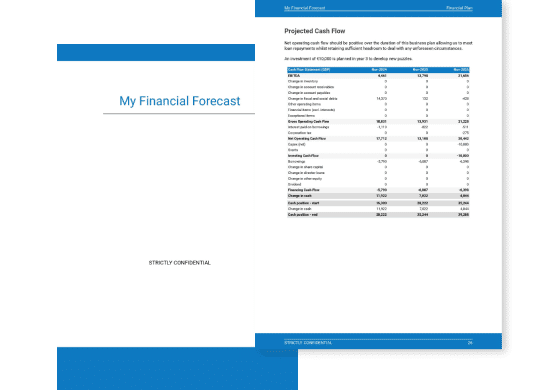
Takeaways
- A financial forecast shows expected growth, profitability, and cash generation metrics for your board game shop.
- Tracking actuals vs. forecast and having an up-to-date financial forecast is key to maintaining visibility on your future cash flows.
- Using financial forecasting software is the modern way of creating and maintaining financial projections.
We hope that this guide helped you gain a clearer perspective on the steps needed to create the financial forecast for a board game shop. Don't hesitate to contact us if you have any questions!
Need a convincing business plan?
The Business Plan Shop makes it easy to create a financial forecast to assess the potential profitability of your projects, and write a business plan that’ll wow investors.

Also on The Business Plan Shop
- Financial forecast example
- How to project revenues for a business?
- Sample financial forecast for business idea
Know someone who runs a board game shop? Share our business guide with them!


